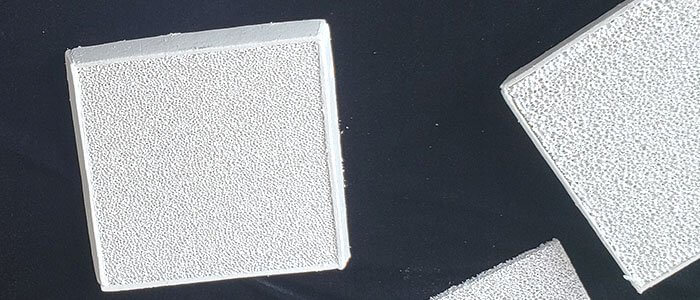Aluminum has become a popular material in the manufacturing industry due to its lightweight, high strength, and versatility. However, the production of high-quality aluminum requires effective filtration technology to remove impurities and maintain the material’s integrity. Alumina ceramic foam filters have emerged as a reliable and efficient filtration method for aluminum alloy production. In this article, we will explore the application of alumina ceramic foam filters in aluminum alloy production and highlight some examples of their successful implementation.
Introduction to Alumina Ceramic Foam Filters
Alumina ceramic foam filters are made up of a network of interconnected pores that enable the flow of molten metal while trapping impurities. The ceramic foam filters are made from a highly porous aluminum oxide ceramic material with an open-cell structure. The filter’s structure and the uniform distribution of pores allow for the filter to remove oxide inclusions, slag, and other impurities that can be detrimental to the quality and strength of aluminum alloys. The filters can effectively trap and hold unwanted particles while still allowing the metal to flow through freely.

Advantages of Alumina Ceramic Foam Filters
The application of alumina ceramic foam filters in aluminum alloy production has several advantages over traditional filtration methods. First, the filters have high porosity, which allows for efficient filtration with minimal pressure drop. The filters are also durable and can withstand high temperatures, making them ideal for use in molten metal filtration. Alumina ceramic foam filters have a large surface area-to-volume ratio, increasing the effectiveness of filtration.
Furthermore, the filters’ unique structure allows for uniform filtering, ensuring consistent quality of the finished product. Additionally, the filters’ open-cell structure allows for easy removal of trapped impurities, making the filters reusable multiple times before replacement.
Case Study 1: Aluminum Die Casting
One of the most common applications of alumina ceramic foam filters is in aluminum die casting. Die casting is a manufacturing process that involves molten metal being injected at high pressure into a mold. The use of alumina ceramic foam filters in die casting ensures that the cast parts are free of impurities and have the desired mechanical properties.
Die casting requires precise control over the casting process to produce parts of consistent quality. One way to achieve this is through filtration of the molten metal before casting. Alumina ceramic foam filters have been shown to effectively remove impurities from the molten metal in the die casting process.
An example of the successful use of alumina ceramic foam filters in aluminum die casting is evident in a German company that specializes in the production of aluminum parts for the automotive industry. The company installed alumina ceramic foam filters in their casting process and saw a significant improvement in the quality and consistency of their finished products. The filters allowed them to achieve the desired mechanical properties and reduced the number of rejects due to casting defects.
Case Study 2: Aluminum Extrusion
Another application of alumina ceramic foam filters is in the aluminum extrusion process. Extrusion is a manufacturing process that involves forcing aluminum through a die to create a specific shape or profile. The extrusion process requires clean and pure aluminum to ensure the desired mechanical properties are maintained.
Alumina ceramic foam filters can be used in the melting and casting process before extrusion to remove impurities from the aluminum. The filters’ effectiveness in removing impurities ensures that the aluminum extrusions have a high-quality surface finish, excellent dimensional accuracy, and the desired mechanical properties.
One example of the successful use of alumina ceramic foam filters in aluminum extrusion is a Belgian company specializing in the production of aluminum profiles. The company installed the filters in their melting and casting process and saw significant improvements in the quality of their extruded products. The filters reduced the number of surface defects and improved the accuracy of the extrusions.
Case Study 3: Aluminum Foil Production
Aluminum foil production is another area where alumina ceramic foam filters can be used to improve the quality of the final product. Aluminum foil production requires a high degree of purity to ensure the foil’s quality and strength. The use of alumina ceramic foam filters in the production process helps to remove impurities, leading to high-quality foil with improved mechanical properties.
One example of the successful use of alumina ceramic foam filters in aluminum foil production is evident in a Chinese company specializing in the production of aluminum foil. The company installed the filters in their casting process and saw significant improvements in the quality of their finished products. The filters helped to remove impurities, leading to smoother and stronger aluminum foil.
Conclusion
Alumina ceramic foam filters have emerged as a reliable and efficient filtration method for aluminum alloy production. The filters’ open-cell structure and high porosity enable the flow of molten metal while trapping impurities. The filters’ effectiveness in removing impurities ensures that the final product has the desired mechanical properties and surface finish.
The examples highlighted in this article demonstrate the successful use of alumina ceramic foam filters in aluminum die casting, extrusion, and foil production. These applications, among others, showcase the versatility and effectiveness of the filtration technology.
With increasing demand for high-quality and reliable aluminum products, alumina ceramic foam filters provide an essential solution for effective filtration in aluminum alloy production. The future of alumina ceramic foam filter filtration technology looks promising, with manufacturers investing in advanced research to improve the filters’ efficiency and effectiveness in removing impurities and maintaining the quality of aluminum alloys.

